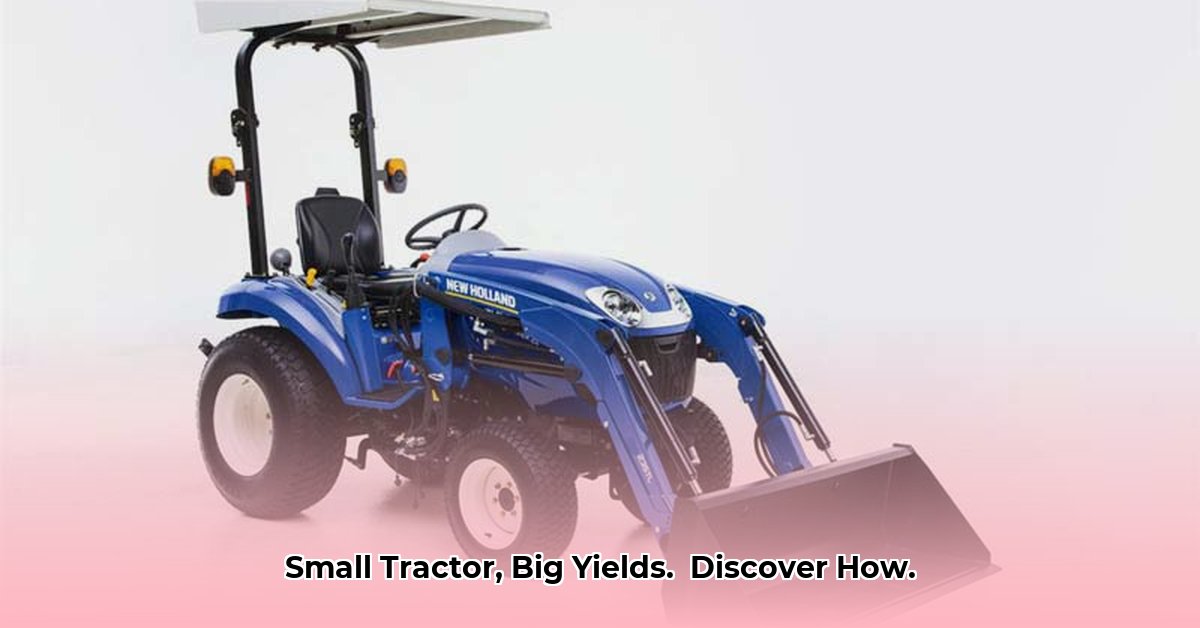
Small New Holland Tractor Powerhouses: Optimizing Your Sustainable Farm
Running a small, sustainable farm demands maximizing every resource. Choosing the right tractor is pivotal. This guide compares New Holland's WORKMASTER and Boomer series, ideal for small-scale farmers prioritizing efficiency and eco-friendliness. We'll analyze key features, ease of use, fuel efficiency, versatility, and cost, providing practical guidance for your selection. For more in-depth information on New Holland sub-compact tractors, check out this helpful resource: New Holland Sub-Compacts.
Is maximizing yield while minimizing environmental impact a priority for you? Then let's delve into how these compact tractors can revolutionize your sustainable farming practices. The WORKMASTER and Boomer series offer distinct advantages, catering to different farming needs and budgets.
WORKMASTER vs. Boomer: A Detailed Comparison
To assist your decision, let's compare these series' key features. Consider your farm's size and typical tasks.
| Feature | WORKMASTER Series | Boomer Series | Considerations |
|---|---|---|---|
| Horsepower | Typically 25-40 HP (suitable for smaller farms) | Usually 40+ HP (ideal for larger operations or heavier tasks) | Higher horsepower handles larger jobs, but is it necessary for your acreage? |
| PTO | Standard (powers attachments) | Standard (often with advanced options) | PTO (Power Take-Off) drives implements like mowers or tillers. Advanced options offer increased flexibility. |
| Hydraulics | Sufficient for most small-scale tasks. | Generally more powerful and responsive, better for heavier implements. | Hydraulics determine lifting and moving power for attachments. |
| Three-Point Hitch | Standard (for rear attachments) | Standard (often with increased lift capacity) | This is crucial for attaching implements. Higher capacity handles heavier implements. |
| Price | Generally more budget-friendly. | Typically more expensive due to added features. | Balance cost with features and your farm's needs. |
| Fuel Efficiency | New Holland promotes fuel efficiency; independent verification is recommended. | Similar manufacturer claims warrant independent verification. | Fuel efficiency is crucial for long-term cost-effectiveness. |
The WORKMASTER is perfect for beginners or those handling lighter tasks. The Boomer, with increased power and capabilities, suits larger farms or more demanding jobs. Don't you want a tractor that perfectly matches your operation's scale?
Ease of Use and Operation: Intuitive Controls for All Farmers
Both series prioritize ease of use with straightforward controls and simple interfaces. New Holland's marketing emphasizes user-friendliness; however, seeking farmer reviews provides valuable firsthand perspectives.
Fuel Efficiency: Saving Money and Protecting the Planet
Fuel costs significantly impact farming profitability. New Holland highlights fuel efficiency in both lines; however, independent verification is crucial. To estimate your fuel consumption, log your fuel usage for different tasks and operational hours. This data allows for accurate cost projections per hour. Isn't accurate cost analysis essential for smart farm management?
Versatility and Applications: From Mowing to Hauling, One Tractor Does It All
These tractors are remarkably versatile, handling numerous tasks—mowing, tilling, hauling, and more—with appropriate attachments. This versatility streamlines workflows and reduces the need for specialized equipment, contributing to efficiency and cost savings.
Cost and ROI: Maximizing Your Investment
The WORKMASTER generally has a lower initial cost, appealing to farmers with stricter budgets. The Boomer's advanced features justify its higher price for those needing advanced capabilities. Calculate your return on investment (ROI) by considering initial cost, operational costs (fuel, maintenance), and long-term productivity gains. Isn't a thorough ROI calculation vital for informed decision-making?
Sustainability: Environmental Considerations Beyond Fuel Efficiency
Sustainability goes beyond fuel efficiency. Small tractors minimize soil compaction compared to larger models. Reduced reliance on specialized equipment lowers your environmental impact. Further research into lifecycle assessments, material sourcing, and emission data provides a complete picture of environmental sustainability.
Choosing the Right Tractor: A Step-by-Step Approach
- Assess your needs: List all tasks, large and small.
- Set your budget: Account for financing options.
- Compare models: Review WORKMASTER and Boomer specifications.
- Explore Financing: Research various financing plans.
- Test drive (if possible): Real-world experience informs your decision.
Maintenance, Operation, and Safety: Prioritizing Best Practices
- Regular Maintenance: Follow your owner's manual for oil changes, filter replacements, and other essential checks. Preventative maintenance avoids costly repairs.
- Safe Operation: Always read the operator's manual thoroughly. Familiarize yourself with controls.
- Safety Gear: Wear appropriate safety gear (sturdy footwear, eye protection, hearing protection). Never operate the tractor when tired or impaired.
Investing in a small New Holland tractor is a significant decision. Careful needs assessment, thorough research, and budget planning pave the way for long-term success and sustainable farming practices.